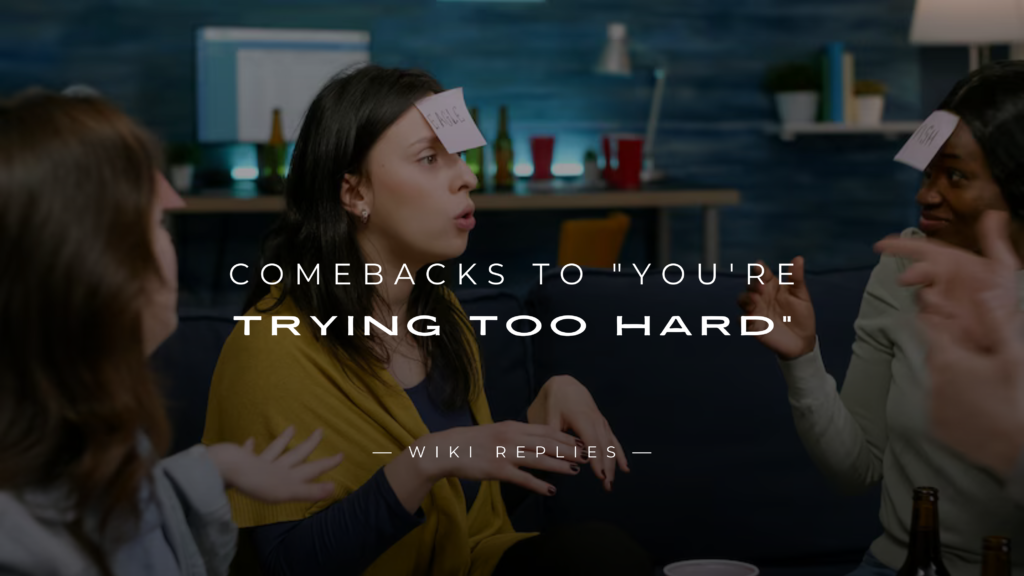Let’s be honest — when someone says “You’re trying too hard,” it hits differently. It’s like they’re throwing shade at your enthusiasm, your energy, and even your confidence. It’s that sneaky little comment meant to make you feel embarrassed for simply caring or putting in the work. Whether you’re dressing up for an event, making an effort to be funny in a conversation, or going all out at work — hearing this phrase can feel like a slap in the face.
But here’s the truth no one tells you: they are the ones feeling uncomfortable. Not you. Why? Because effort exposes those who aren’t willing to step up. So, before you let that comment deflate your spirit, let’s learn how to come back stronger — and maybe even shut them down with a smile.

220+ Comebacks to “You’re Trying Too Hard”
Sarcastic Comebacks
- Oh no, effort! The horror!
- Yeah, because success comes from sitting around.
- Sorry, I forgot I was supposed to aim for mediocre.
- My bad — I’ll tone it down to meet your energy.
- You’re right, I should just wing it like a pro.
- Trying too hard? Nah, I call this light work.
- I’ll be sure to submit my resignation from caring.
- Oops, I accidentally activated my ambition again.
- Wow, sorry for not coasting through life.
- Next time I’ll try the bare minimum — just for you.
Savage Comebacks
- At least I’m trying — can’t say the same for you.
- Funny, effort makes you uncomfortable?
- And yet, here I am doing better.
- Keep watching while I keep winning.
- Someone’s allergic to ambition, I see.
- You can’t relate to effort, huh? Must be hard.
- Better to try too hard than not try at all.
- Don’t worry, I’m carrying both our weights.
- I try hard; you try excuses. We’re different.
- Your standards are safe. I’m not aiming that low.
Witty Comebacks
- Effort? I thought this was a talent show.
- Trying hard scares lazy people, I get it.
- I aim high. Sorry if it makes you dizzy.
- No worries — overachiever is my brand.
- I didn’t realize success was cringy now.
- Trying hard? That’s just called doing it right.
- Guess someone’s allergic to hustle.
- Relax, this is me warming up.
- Oh, I thought we were supposed to care.
- Funny, winners call it dedication.
Funny Comebacks
- I’m not even in second gear yet.
- Trying hard? This is me coasting.
- Hang on, let me activate “try less” mode.
- I’m just auditioning for the “overachiever” club.
- Too hard? My mom says I’m doing great.
- Don’t hate the hustle, hate your comfort zone.
- This is my casual try face.
- Plot twist: I’m actually lazy inside.
- Just practicing for when I actually try.
- Relax, it’s only 90% effort today.
Polite but Firm Comebacks
- Thanks for noticing my effort!
- I believe in giving my best, always.
- Effort is important to me — I stand by it.
- I’m committed to doing things properly.
- I respect your view, but I’ll keep giving my all.
- For me, trying hard is a sign of respect.
- I’d rather try too much than too little.
- Thanks, but I’m comfortable pushing myself.
- That’s just my work ethic — it works for me.
- I hear you, but I won’t lower my standards.
Self-Deprecating Comebacks
- Trust me, this is me barely trying. Sad, right?
- I try hard because talent didn’t show up today.
- Yeah, overcompensating is kind of my thing.
- If I don’t try hard, I’ve got nothing left!
- I try too hard — it’s a survival skill now.
- It’s cute you think this is peak performance.
- This is my desperate attempt at relevance.
- Trying hard is my only personality trait.
- Without effort, I’m just awkward silence.
- Hey, I need all the help I can get!
Reverse Psychology Comebacks
- You’re right. I should probably try even harder.
- Good call — I’ll double my efforts now.
- Thanks! Motivated me to push more.
- You’ve inspired me to crank it up.
- Great point. Time to overdo it even more.
- I hear you… so I’m going to triple down.
- I appreciate the feedback — now watch me go harder.
- Excellent, I was wondering if I could do more.
- That’s the sign I needed to go all in.
- Thanks for the reminder — let’s go all out.
onfident Comebacks
- I set the bar high on purpose.
- Trying hard is how I win.
- I’ll never apologize for giving my best.
- This is just my standard, nothing extra.
- I don’t settle — simple as that.
- I’m built for effort, not excuses.
- Excellence requires exactly this much energy.
- I go all in or not at all.
- Effort is my comfort zone.
- That’s right — I try hard, and I’m proud of it.
Mock Confused Comebacks
- Wait, people don’t try? Wild.
- Oh… was I supposed to slack off?
- Confused — effort is bad now?
- Huh? So aiming high is cringe?
- Hold on, is this the no-effort club?
- Sorry, I didn’t get the “bare minimum” memo.
- Oh, so success is embarrassing now?
- Strange, I thought effort was the point.
- I’m lost — so we’re competing for laziness?
- Wow, okay… note to self: do less greatness.
Minimalist One-Liners
- Effort wins.
- Hustle > excuses.
- Winners try.
- Mediocre fears effort.
- Success needs sweat.
- Try hard, win hard.
- Effort is sexy.
- Too hard? Good.
- I’m built different.
- Energy scares slackers.
Pop Culture Comebacks
- Tell that to Beyoncé.
- Kobe tried harder — look how that turned out.
- Taylor Swift rewrites albums — I can try, too.
- Michael Jordan didn’t coast, neither will I.
- If Rihanna can work, so can I.
- Serena never took it easy.
- Even Mario jumps harder.
- Beyoncé said: always be in formation.
- LeBron’s still trying — and winning.
- I’m on my Rocky Balboa arc.
Passive-Aggressive Comebacks
- Sorry, I didn’t mean to outshine you.
- My effort must be exhausting… for you.
- I’ll try to be less… effective next time.
- Sorry my goals make you uncomfortable.
- I didn’t realize ambition was offensive.
- I’ll keep winning quietly, promise.
- Didn’t mean to disturb your chill with my effort.
- I’ll try less, so you can catch up.
- Sorry for setting the bar too high.
- I’ll tone it down — wouldn’t want to stress you.
Philosophical Comebacks
- Effort is the price of mastery.
- To try is to grow.
- Without effort, there is no progress.
- Struggle births success.
- Trying hard is the path, not the problem.
- Greatness demands more.
- The journey belongs to those who strive.
- Effort defines destiny.
- Energy given returns in success.
- Laziness fears discipline.
Petty Comebacks
- And yet, I’m still ahead.
- Funny — trying works though.
- Hate all you want, I’m still shining.
- I’ll try hard while you stay stuck.
- Weird flex, but okay.
- Keep talking, I’ll keep winning.
- Sorry, success doesn’t come from chilling.
- Stay mad while I stay busy.
- Must be tough watching me succeed.
- Jealousy looks tiring too.
Playfully Flirtatious Comebacks
- Only trying hard because you’re watching.
- I’d try harder just to impress you.
- Can’t help it when you’re around.
- Blame your charm — makes me overdo it.
- Effort looks good on me, right?
- Trying hard… for your attention.
- Guilty — I always go extra when you’re near.
- I call it passion. Especially when you’re here.
- Hard work, soft heart — for you.
- Overachiever? Only when you’re the prize.
Deadpan Comebacks
- Noted. Moving on.
- And? What’s your point?
- That’s the idea.
- Try harder next time — at insults.
- Cool observation. Irrelevant though.
- Yes. I do things properly. Shocking.
- Imagine caring about that.
- Fascinating. Anyway, I’m busy winning.
- You done? I’ve got goals.
- Trying too hard? Better than thinking too little.
Old-School Proverb Comebacks
- No pain, no gain.
- Hard work beats talent when talent doesn’t work hard.
- Rome wasn’t built in a day.
- Fortune favors the bold.
- You reap what you sow.
- The early bird gets the worm.
- Iron sharpens iron.
- Success comes to those who hustle.
- Slow and steady wins the race — but steady means effort.
- A river cuts through rock by persistence, not power.
Underdog Energy Comebacks
- I have to — no one’s handing me anything.
- I’m not here to coast, I’m here to climb.
- When you start at the bottom, effort is everything.
- This is survival mode, not extra credit.
- I’m working like I’ve got something to prove — because I do.
- I try hard because no one’s saving me.
- Gotta hustle harder when you’re the underdog.
- They count me out — I count reps.
- Effort is my only advantage right now.
- Watch me turn struggle into success.
Deflect with Humor Comebacks
- Yeah, I’m trying hard — it’s exhausting being this awesome.
- Someone’s got to keep the overachiever stereotype alive.
- I’m just training for the Try-Hard Olympics.
- Trying hard is my cardio.
- What can I say? Effort looks good on me.
- Overachieving: it’s a lifestyle, not a phase.
- My mom says I’m special, so I try extra.
- I’m just here to make everyone else look chill.
- Can’t stop, won’t stop — send snacks.
- At this point, it’s a personality trait.
Challenge Comebacks
- Bet I can try even harder.
- Watch me — I’m just getting started.
- Challenge accepted.
- You think this is hard? Stay tuned.
- Doubt fuels me — thanks.
- Say less, I’m leveling up.
- I live for this grind.
- I’m built for the challenge.
- Push me, I push back harder.
- This is round one — I go twelve.
Zen Master Comebacks
- Effort is presence in motion.
- Trying is living fully.
- The river flows by persistence, not force.
- Effort aligns me with purpose.
- Hard work empties the ego.
- To try is to honor the task.
- Energy given returns in growth.
- I water the seeds — results will bloom.
- Trying hard is simply being mindful in action.
- I do, therefore I am.
Mic Drop Comebacks
- Effort got me here — deal with it.
- And yet, I’m winning.
- Results speak. Effort works.
- Try harder — it might help you.
- Success doesn’t apologize for hustle.
- Your comfort zone isn’t my destination.
- Haters watch, workers win.
- No shame in outworking everyone.
- Jealousy spotted. Effort confirmed.
- I try hard. I win hard. End of story.
The Psychology Behind “You’re Trying Too Hard”
Ever wonder why this phrase feels so loaded? It’s not just words — it’s psychology at play. People use “You’re trying too hard” to put you back in your place. It’s a subtle way of saying, “You’re doing too much, and it’s making me uncomfortable.” It can also be a form of negging, which is a backhanded compliment designed to lower your self-esteem so they can feel superior.
It’s a way of controlling the social hierarchy. You’re showing ambition or passion, and rather than matching your energy, they choose to diminish it. So, understand this: it’s not about you doing too much — it’s about them doing too little.
Why People Say It (And What They Really Mean)
Not every person who drops this line is a villain. Sometimes, they mean well but communicate poorly. Here are the usual suspects:
- The Insecure One: They feel threatened by your energy, so they try to make you feel small.
- The Teaser: They’re joking, but it lands awkwardly.
- The Traditionalist: They believe effort should be invisible and subtle.
- The Jealous Type: Your hard work highlights their laziness, so they deflect.
Recognizing who you’re dealing with makes it easier to choose the right comeback — or decide if they even deserve one.
Understanding the Context Matters
Before you unleash your comeback, pause. Not every situation calls for a mic-drop moment. Context is everything.
- Casual Settings vs Professional Environments
At a family BBQ or a night out with friends? You can afford to be playful or cheeky with your response. But in a professional setting, like a work meeting or a networking event, you’ll want to keep your reply sharp but polished. Saying the wrong thing at work can linger longer than you think.
- Online Trolls vs Friends Making Jokes
Let’s not forget the digital battlefield — social media. Trolls thrive on your reaction. If you clap back, you feed them. Friends, on the other hand, might just be ribbing you. Learn to distinguish between malicious jabs and harmless jokes before you fire back.
The Power of a Good Comeback
A well-timed comeback isn’t just words — it’s an art form. It reclaims your power, shifts the energy, and even earns respect.
- Confidence Is Key
Here’s the trick: it’s not just what you say, but how you say it. No stammering, no nervous laughs. Deliver your line with calm, measured confidence. Eye contact? Check. Steady voice? Double-check. When you look unbothered, you win before the words even leave your mouth.
- Don’t Let It Derail Your Mood
The worst thing you can do is let this phrase ruin your day. A good comeback protects your peace. Think of it like armor — it shields you and lets you move on, unbothered and unstoppable.
Top 10 Best Comebacks to “You’re Trying Too Hard”
Time for the main event: your arsenal of comebacks. Ready? Here are 10 killer replies for every mood and setting.
Light and Funny Comebacks
When you want to keep things breezy but still shut it down:
- “Well, somebody’s gotta try around here!”
- “Trying hard beats hardly trying, don’t you think?”
- “I know, right? Imagine if I tried even harder!”
These work well in casual settings where you want to defuse tension without making enemies.
Sarcastic but Playful Responses
For when you feel a little spicy:
- “Oh no, effort? How dare I!”
- “Next time I’ll try just hard enough to meet your expert standards.”
- “Guess I’ll go back to slacking then. Problem solved!”
Sarcasm can be your best friend — just make sure it doesn’t cross into cruelty (unless they deserve it).
Confident and Assertive Retorts
Perfect for when you mean business:
- “I put in effort because I care. Simple as that.”
- “Trying hard is how winners are made.”
- “If that makes you uncomfortable, that’s really a you problem, not mine.”
Use these when someone is genuinely trying to belittle you. They communicate strength without raising your voice.
Calm and Classy Replies
When you want to stay poised:
- “Thanks for your feedback. I’ll keep doing my best.”
- “Effort isn’t a bad thing. But thanks for noticing.”
- “I’d rather try too hard than not try at all.”
These are great for professional environments where you need to maintain decorum while standing your ground.
How to Choose the Right Comeback
Picking the perfect comeback isn’t random — it’s strategy.
- Match the Energy
If they’re joking, joke back. If they’re hostile, go firm but not aggressive. Always match or slightly outclass their energy. Never go lower — that’s how you lose the upper hand.
- Read the Room
Humor kills in friendly settings but flops in serious situations. Before you fire your comeback, take a mental snapshot of your audience. Will they laugh? Will they gasp? Play to the crowd, not just your ego.
When Silence Is the Best Comeback
Sometimes the ultimate flex is to say nothing at all.
- The Power of Non-Reaction
By refusing to engage, you send a clear message: “You don’t even register on my radar.” It’s powerful because it denies them the attention they crave. Silence can scream louder than words when done right.
- Letting Actions Speak Louder Than Words
Nothing beats success. Keep shining, keep achieving. That’s the long game — and trust me, it always wins. The same people who mocked your effort will be clapping when you cross the finish line.
Building Unshakeable Confidence
If this phrase keeps bothering you, it’s time to level up your confidence game.
Self-Affirmations That Work
Your mind believes what you repeatedly tell it. Try these affirmations:
- “My effort is valuable and noticed.”
- “I am proud of my dedication.”
- “I don’t shrink to make others comfortable.”
Say them daily until they feel like truth, not just words.
Stop Seeking Approval
Here’s a hard pill: Not everyone will cheer for you. And that’s okay. Stop basing your worth on outside applause. Measure your success by your standards, not theirs. That’s when true confidence is born.
Conclusion
In conclusion, having a quick, witty, or clever comeback to the phrase “You’re trying too hard” can make you feel more confident and in control of a conversation. Whether you prefer a humorous response or something more sassy, these 220+ comebacks offer a variety of options to suit any situation. Remember, it’s all about staying confident and not letting others’ opinions shake you. If you’re looking for even more ways to handle challenging conversations, check out our guide on 220+ Best Comebacks to “You’re a Know It All” for additional inspiration!
FAQs
Q. Why do people say “You’re trying too hard”?
They usually say it to make you feel self-conscious about your effort or enthusiasm. It’s often a reflection of their own insecurities, discomfort, or jealousy when someone else is willing to go the extra mile.
Q. Is it always bad to try too hard?
Absolutely not! Putting in effort is how you grow, learn, and succeed. The only time it becomes an issue is if you’re exhausting yourself or compromising your values to please others.
Q. What if I actually am trying too hard?
If your effort feels forced, exhausting, or desperate, it’s worth checking in with yourself. Balance is key. Adjust your approach, but don’t lose your drive — just channel it more effectively.
Q. Can ignoring comments like this make me stronger?
Yes! Ignoring petty comments builds mental toughness. It trains you to stay focused on your goals instead of getting sidetracked by every opinion that comes your way.
Q. How can I stop caring about what people think?
Start by focusing on your own values and goals. Practice daily affirmations, limit time with negative people, and celebrate your small wins. Over time, you’ll care less about external approval and more about your own self-worth.










